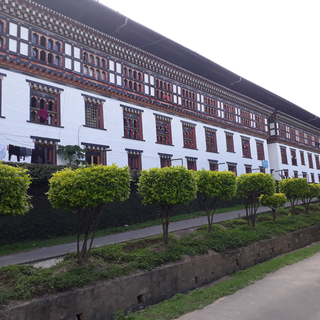
Vocational education is education that prepares people for a skilled craft. Vocational education can also be seen as that type of education given to an individual to prepare that individual to be gainfully employed or self employed with requisite skill. Vocational education is known by a variety of names, depending on the country concerned, including career and technical education, or acronyms such as TVET and TAFE. TVE refers to all forms and levels of education which provide knowledge and skills related to occupations in various sectors of economic and social life through formal, non-formal and informal learning methods in both school-based and work-based learning contexts. To achieve its aims and purposes, TVE focuses on the learning and mastery of specialized techniques and the scientific principles underlying those techniques, as well as general knowledge, skills and values.

The Department for International Development (DFID) was a ministerial department of the Government of the United Kingdom, from 1997 to 2020. It was responsible for administering foreign aid internationally.

The Government of Jersey is the executive body of the States of Jersey and is the central government of the Bailiwick of Jersey. The government is led by the Chief Minister, who nominates all the remaining ministers, all elected by the States Assembly.

Gross National Happiness, sometimes called Gross Domestic Happiness (GDH), is a philosophy that guides the government of Bhutan. It includes an index which is used to measure the collective happiness and well-being of a population. Gross National Happiness Index is instituted as the goal of the government of Bhutan in the Constitution of Bhutan, enacted on 18 July 2008.
Te Manatū WakaMinistry of Transport is the public service department of New Zealand charged with advising the New Zealand Government on transport policy. The Ministry works closely with other government transport partners, including the New Zealand Transport Agency (NZTA) to advance their strategic objectives.
The Ministry of Colleges and Universities is the ministry of the Government of Ontario responsible for administration of laws relating to post-secondary education. This ministry is one of two education ministries, the other being the Ministry of Education. The Ministry's offices are in downtown Toronto. The current minister is Nolan Quinn.

Community education, also known as Community-Based Education or Community Learning & Development, or Development Education is an organization's programs to promote learning and social development work with individuals and groups in their communities using a range of formal and informal methods. A common defining feature is that programmes and activities are developed in dialogue with communities and participants. The purpose of community learning and development is to develop the capacity of individuals and groups of all ages through their actions, the capacity of communities, to improve their quality of life. Central to this is their ability to participate in democratic processes.

The Ministry of Micro, Small and Medium Enterprises is the ministry in the Government of India. It is the apex executive body for the formulation and administration of rules, regulations and laws relating to micro, small and medium enterprises in India. The Minister of Micro, Small and Medium Enterprises is Jitan Ram Manjhi.

Kuwait is an emirate with an autocratic political system. The Emir of Kuwait, a hereditary monarch from the Al Sabah ruling family appoints the prime minister and other members of government, as well as members of judicial, police and financial institutions.

The Ministry of Education (MoE) is a ministry of the Government of India, responsible for the implementation of the National Policy on Education. The ministry is further divided into two departments: the Department of School Education and Literacy, which deals with primary, secondary and higher secondary education, adult education and literacy, and the Department of Higher Education, which deals with university level education, technical education, scholarships, etc.

The Department for Education (DfE) is a ministerial department of the Government of the United Kingdom. It is responsible for child protection, child services, education, apprenticeships, and wider skills in England.

The College of Natural Resources, Royal University of Bhutan is a college offering courses on natural resources management, that include organic agriculture, animal science, environment and climate, food science and technology, forest science and sustainable development The college is located in Lobesa, Punakha District, in central west Bhutan. The college campus is spread over 98 acres (40 ha) on the eastern slope of Lobesa and is about 140 km (87 mi) away from the Paro International Airport.

Suyoi bin Haji Osman, sometimes referred to as Pehin Dato Suyoi, is a Bruneian aristocrat, politician and diplomat who was the Minister of Health from 2005 to 2010, the Minister of Development from 2010 to 2015, the Minister of Education from 2015 to 2018, and currently a member of the Brunei Legislative Council (LegCo).

Climate change education (CCE) is education that aims to address and develop effective responses to climate change. It helps learners understand the causes and consequences of climate change, prepares them to live with the impacts of climate change and empowers learners to take appropriate actions to adopt more sustainable lifestyles. Climate change and climate change education are global challenges that can be anchored in the curriculum in order to provide local learning and widen up mindset shifts on how climate change can be mitigated. In such as case CCE is more than climate change literacy but understanding ways of dealing with climate
The Quality Council of India (QCI) was set up as a public private partnership model on the model existing in Netherlands at the time, where although the National Accreditation Body (NAB) was not owned by the government, the government supported it and it was exceedingly used as a third party agency to improve quality in departments and industry. QCI thus came to be organized as an independent autonomous body that worked towards assuring quality standards across all spheres of economic and social activities. Key industry associations, i.e. Associated Chambers of Commerce and Industry of India (ASSOCHAM), Confederation of Indian Industry (CII) and Federation of Indian Chambers of Commerce and Industry (FICCI) became the promoters of the organizers and QCI got established under the Societies Registration Act in 1996 to provide accreditation services in various sectors for product, services and persons.
T Levels are technical-based qualifications in England, developed in collaboration with employers and businesses, with content that meets the needs of industry and prepares students for work, further training, or study.

Amr Ahmed Samih Talaat is an Egyptian engineer, academic, and government official serving as the Minister of Communications and Information Technology of Egypt since June 14, 2018. Before his appointment as minister, he had a long career in the private sector, including a tenure at IBM Egypt where he served as Country general manager. Talaat holds degrees in engineering and business administration and has also been active in academia as an adjunct professor at Cairo University. In his role as minister, he has been instrumental in advancing Egypt's digital infrastructure and implementing the country's digital transformation strategy.

Educational management refers to the administration of the education system in which a group combines human and material resources to supervise, plan, strategise, and implement structures to execute an education system. Education is the equipping of knowledge, skills, values, beliefs, habits, and attitudes with learning experiences. The education system is an ecosystem of professionals in educational institutions, such as government ministries, unions, statutory boards, agencies, and schools. The education system consists of political heads, principals, teaching staff, non-teaching staff, administrative personnel and other educational professionals working together to enrich and enhance. At all levels of the educational ecosystem, management is required; management involves the planning, organising, implementation, review, evaluation, and integration of an institution. Research in educational management should explore the dynamic interplay among educational leaders, their followers, and the broader community to enhance the quality of teaching and learning outcomes.

The Ghana Education Service (GES) is a government agency under the Ministry of Education responsible for implementing government policies that ensure that Ghanaians of school-going age irrespective of their ethnicity, gender, disability, religious and political dispositions receive quality formal education. The Ghana Education Service is governed by a fifteen-member council called the GES council.

The Ministry of Skill Development and Entrepreneurship is a Ministry of Government of Maharashtra to coordinate all skill development,Employment and entrepreneurship efforts in Maharashtra.















